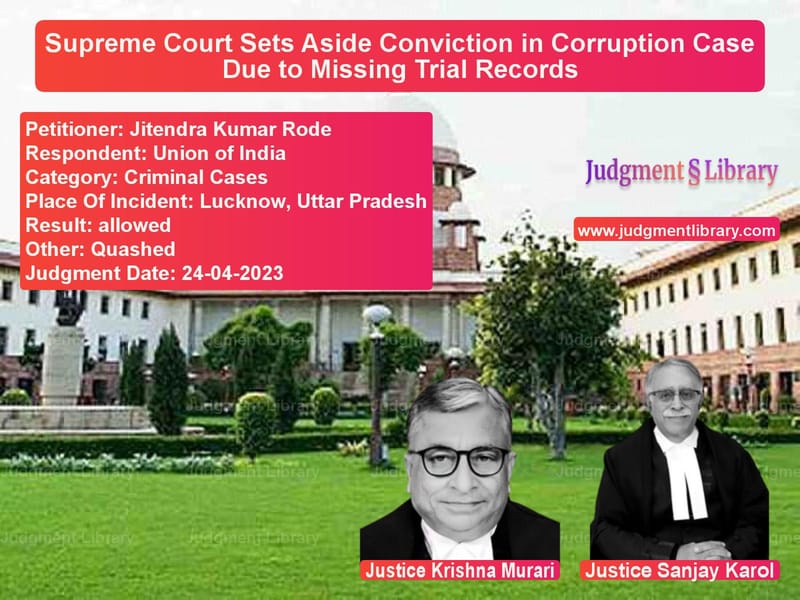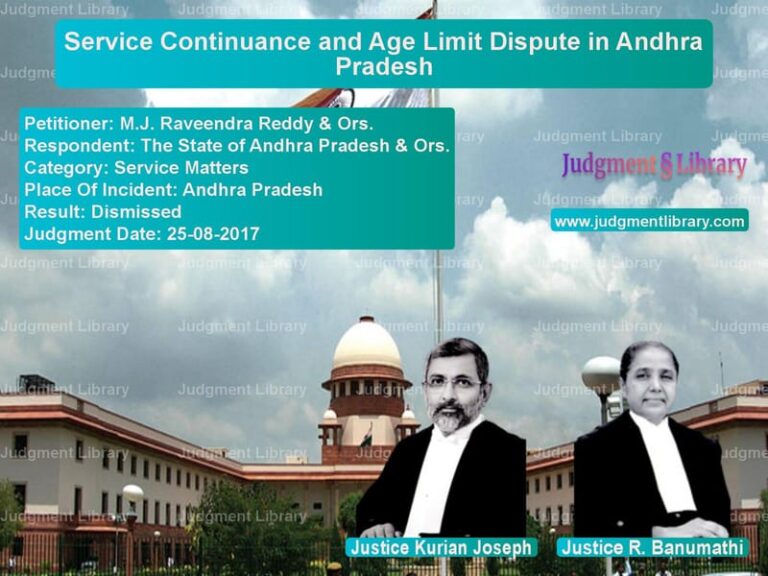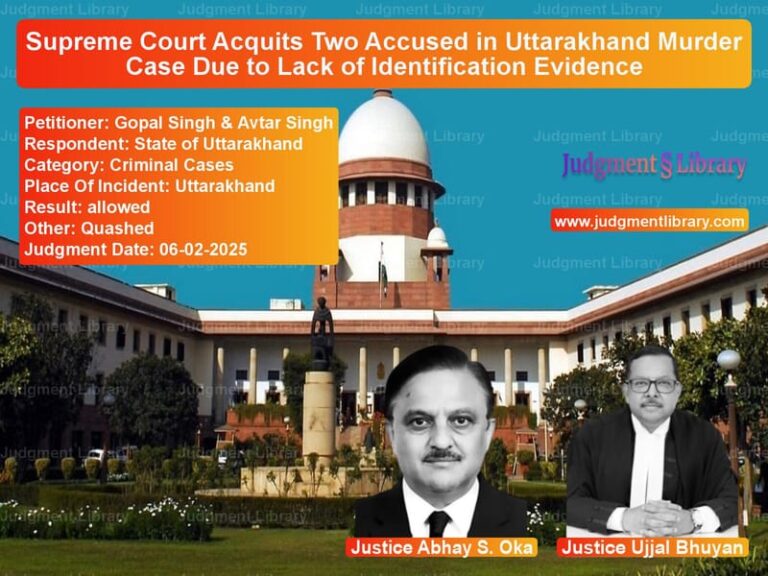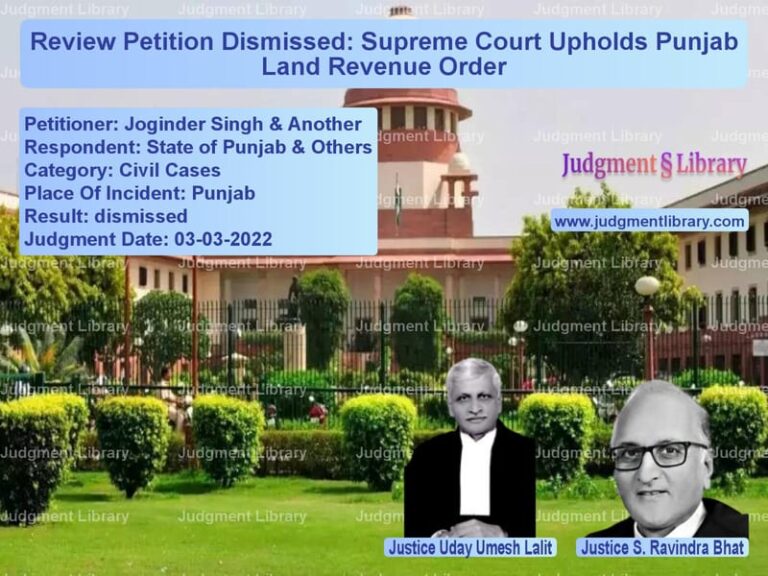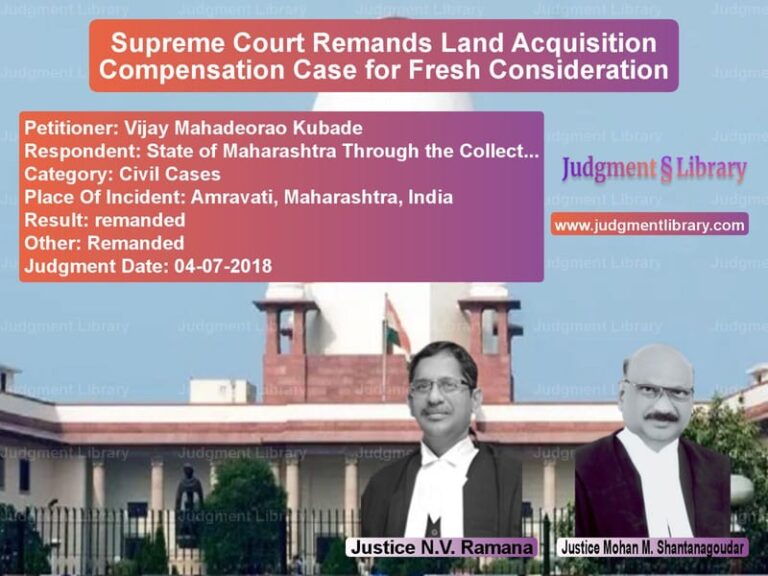Supreme Court Sets Aside Conviction in Corruption Case Due to Missing Trial Records
The Supreme Court of India, in the case of Jitendra Kumar Rode vs. Union of India, set aside the conviction of the appellant in a corruption case due to the non-availability of trial court records. The Court emphasized that a conviction without access to the full trial record violates the accused’s fundamental rights under Article 21 of the Constitution.
The judgment underscores the significance of procedural fairness and the necessity for courts to ensure that the accused’s right to appeal is not hindered due to missing records.
Background of the Case
The case originated from a corruption charge against Jitendra Kumar Rode, who was accused of accepting a bribe of ₹500 while serving as an Assistant Commercial Manager in the Northern Railway, Lucknow. The trial court convicted him under Sections 7, 13(1), and 13(2) of the Prevention of Corruption Act, 1988, sentencing him to rigorous imprisonment of up to two years along with a fine.
On appeal, the Allahabad High Court upheld the conviction in its judgment dated November 23, 2022. However, the High Court noted that the trial court records were unavailable despite multiple efforts to retrieve them.
Key Legal Issues
1. Whether the appellate court could uphold a conviction in the absence of trial court records.
2. Whether the failure to reconstruct the trial records violated the accused’s right to a fair trial under Article 21 of the Constitution.
3. Whether the conviction should be set aside due to procedural lapses.
Arguments Presented
Petitioner (Jitendra Kumar Rode) Arguments
- The trial court records were lost, and the reconstruction attempts were inadequate.
- Without complete records, the High Court could not properly evaluate the evidence, making the conviction unfair.
- Article 21 guarantees fair legal procedure, and upholding a conviction in the absence of records violates this right.
Respondent (Union of India) Arguments
- The trial court had convicted the appellant based on clear evidence.
- The High Court reviewed the available records and found no reason to interfere with the conviction.
- The appellant was found guilty of corruption, and setting aside the conviction would send a wrong message.
Supreme Court’s Observations
The Supreme Court, led by Justices Krishna Murari and Sanjay Karol, made the following key observations:
- The High Court noted that the trial records were lost and that reconstruction efforts failed to provide complete documentation.
- The conviction was upheld without key documents, including witness statements and other essential trial materials.
- Article 21 mandates fair legal procedure, which includes access to records for appeal.
- Without trial records, the appellate court cannot properly assess whether the conviction was justified.
The Court stated:
“A conviction of any nature permanently marks a person’s character. It would be, in the specific circumstances of this case, unjustified.”
Final Judgment
The Supreme Court ruled as follows:
- The conviction of Jitendra Kumar Rode was set aside.
- The fine imposed by the High Court was refunded to the appellant.
- The judgment reinforced the importance of digitizing court records to prevent similar issues in the future.
Implications of the Judgment
The ruling has significant implications for criminal trials and appeals:
- Ensuring Access to Trial Records: Courts must ensure that all trial records are available for fair appellate review.
- Right to Fair Trial: Convictions cannot be sustained without a complete review of the case records.
- Encouragement of Judicial Digitization: The judgment highlights the need for digital preservation of case files to prevent loss of crucial documents.
Conclusion
The Supreme Court’s ruling in Jitendra Kumar Rode vs. Union of India reinforces the principle that a fair trial includes access to complete case records for appeal. The decision ensures that procedural fairness is upheld in criminal cases and sets a precedent for courts to adopt better record-keeping and digitization practices.
Petitioner Name: Jitendra Kumar Rode.Respondent Name: Union of India.Judgment By: Justice Krishna Murari, Justice Sanjay Karol.Place Of Incident: Lucknow, Uttar Pradesh.Judgment Date: 24-04-2023.
Don’t miss out on the full details! Download the complete judgment in PDF format below and gain valuable insights instantly!
Download Judgment: jitendra-kumar-rode-vs-union-of-india-supreme-court-of-india-judgment-dated-24-04-2023.pdf
Directly Download Judgment: Directly download this Judgment
See all petitions in Fraud and Forgery
See all petitions in Bail and Anticipatory Bail
See all petitions in Extortion and Blackmail
See all petitions in Judgment by Krishna Murari
See all petitions in Judgment by Sanjay Karol
See all petitions in allowed
See all petitions in Quashed
See all petitions in supreme court of India judgments April 2023
See all petitions in 2023 judgments
See all posts in Criminal Cases Category
See all allowed petitions in Criminal Cases Category
See all Dismissed petitions in Criminal Cases Category
See all partially allowed petitions in Criminal Cases Category

